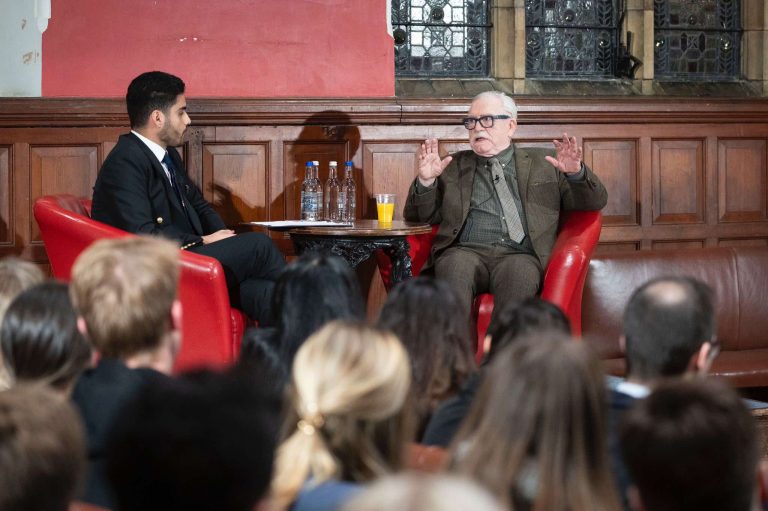Sarah Rana is an MPhil student in global area studies at St. Anthony’s College. She is the author of her 2024 debut, Hope Ablaze, and of an adult fantasy trilogy to be released in 2026.
Cherwell: You studied Asian and Middle Eastern studies as an undergraduate and now you’re pursuing an M. Phil in a related field in economic policy. Do you feel like your degree in any way informs your writing, or is that something that you view as entirely separate?
Sarah: I want to make it very clear that my degrees are very separate from my creative writing. However, I think what’s so fun about being an author is you will find inspiration from anything and everything. So much of my undergrad econ class helped inform some of my writing I do now for my fantasy novel. [So did] the course that I took, contemporary Asian studies under the Asian Institute at the University of Toronto. So there’s a lot of flexibility there: I took a lot of history and contemporary politics courses, that looked at the economy and looked at modernity and looked at the transition of the political economy from the colonial era to modernity and studied infrastructure projects. It was a lot. It was crazy, kind of three different degrees in one.
But every single one of those really helped me in writing Hope Ablaze and my other books that will be coming out because you’re literally looking at the way that the world developed from, like, the 1800s, all the way to now. It’s 224 years of history right there – looking at politics, economy, social life. Given that my book has a historical point of view, and it looks at contemporary politics, literally all of that informed it. The troubling part when you’re a writer is taking large swathes of information and condensing it. So for me, the trouble was, you know, I didn’t want my book to sound so preachy and political. So I really had to, like, refine, refine, refine every draft with my editor. Even with my upcoming books, most of what I had to do was just cutting off a lot of information to make it very accessible for the reader.
Cherwell: Readers have reported being struck by how relevant the central premise became to the events of the 2024 election season. Several reviews pointed out, for instance, that the news of Muslim attendees being forcibly removed from Democrat events very closely mirrored the experience of your protagonist. What observations would you say led you to portraying this experience of exclusion in your novel?
Sarah: It’s very interesting that you bring that up, because I wrote the novel four years ago now. I was very young – I think I was in my second or third year of my undergrad when I first wrote it – so it was long before a lot of what we saw transpire in the recent US and UK elections and in the upcoming Canadian election. What I wrote was not an isolated experience. It’s something that many minorities (especially people of color) and Muslims after the war on Terror and 9/11 went through in virtually every election or any big event that has to do with politics. I experienced that being from Quebec, which has a lot of exclusionary laws targeting Muslims. But I also did grow up in the US and I got to see both dichotomies of that experience. And so I really wanted to reflect that in my writing, and it was just a coincidence that the book ended up debuting in the same year. In fact, I wrote it after Trump was elected and then edited it during Biden’s term. It just shows that a lot of these actions repeat, and they’re never in a vacuum.
Cherwell: Another element of your novel infused with renewed relevance by the election was the question of the “Muslim voting bloc”, and how contests for that bloc reflected a sort of tension between the ideals of liberal democratic representation and the actual practice of that inclusion in political spaces.
Sarah: Yes, so that was another story. That was another realization that I had. I did not expect with the election that the Muslim voting bloc would be so relevant again, because I think it was more relevant definitely eight, ten years ago. I wrote it in for two reasons. Firstly, I think it’s expected for any minority voting bloc, (“minorities” who are still a big chunk of the vote) to vote in a certain way. For Muslims, we’re often pigeonholed into voting with a more liberal party or left-wing party, because we’re seen as choosing the lesser evils, especially when it comes to foreign policy that hurts our people.
But what I wanted to point out was the striking hypocrisy in this rhetoric. I don’t endorse any one side, but I still think it’s important for me to point out that liberal governments and liberal parties will still demonize our people and countries overseas. We saw that happen in the Obama era with his destructive foreign policy: [he] bombed many countries in the Middle East, and near Middle East – Yemen, Somalia, Afghanistan, Pakistan (where my family’s from). I wanted to point out some of the striking hypocrisies in what is used in that rhetoric, that we have to vote in the lesser evil. It doesn’t mean that you vote for the other bloc either, that’s up to you, but I think people should feel free to come to their own decision, exercise their own vote, because that is the point of a democracy, and expecting us to vote a certain way, or just taking us for granted – even when you’re bombing people in the Middle East or spreading Islamophobic and anti-Arab rhetoric – does not mean you’re going to have our vote. And so I think this election really showed that they should never take us for granted.
Cherwell: In Hope Ablaze, poetry is both a living force and an integral part of the protagonist’s journey, blending personal expression with the magical realist elements of the story. The novel also engages deeply with political themes. What are your thoughts on the political function of poetry, both within your work and more broadly?
That’s a really interesting question. I think there’s a couple ways. Firstly George Orwell said that, and I’m paraphrasing here, that to say that art is not political is in itself a political act. And so I subscribe to this belief. I think this is true no matter what you write about, be it romance or anything. And so I don’t think writers should shy away from talking about political subjects.
Sarah: I don’t think we need to talk about politics for it to be political. In fact, while my book is politically charged, I don’t like to just call it a political novel. Because it’s a lot of things, you know? It talks about history, it talks about partition, it talks about sedition, it talks about politics, it talks about basketball. As for the role of poetry: it’s been used in resistance movements and revolutions, especially in modernity. Very famously, you’ve had poets as part of different resistance and revolutionary groups across Asia to overthrow colonial forces, like the French, like the British. You saw this a lot in Lebanon and Central Asia, both epicenters of poetry. You saw this in Pakistan and in different regions in the Indian subcontinent. I wanted to highlight that that tradition was a big part of the crackdown against artists.
Poetic symposiums, in the 1970s, I believe, were used to overthrow or to call out one of the most infamous Pakistani dictators. Art and poetry is so human that it is used as a tool to appeal to people’s emotions and call out oppressors. People use and try to weaponize our bodies against us, but the one thing they can’t take away from us is our tongues, and when they try to do that, that’s when art pushes back. My character’s arc is slowly realizing that, which is why she explores a lot of her ancestral history, her family history, and herself. She realizes she’s letting people use her body and her tongue against her, and as Foucault says in Biopolitics, one of the ways that the state tries to control someone is always going to be through their body. Art, I think, is very powerful, because it’s not physical. It can also be lyrical, it doesn’t have to take a physical form.
Cherwell: In a post on Goodreads around the release of your book, you described Hope Ablaze as a diasporic story. Amma’s voice is initially filtered through Nida’s perspective and marked by broken English, but she is later revealed to be a skilled poet whose complex verse resists translation. Could you discuss the role of language barriers in your work, particularly how poetry bridges – or highlights – gaps in translation and cultural transition?
Sarah: There’s a lot to unpack there because I think there’s three key concepts that you touched on. I think the first is the idea of the diaspora. On diaspora: modernity pulled large swathes of people from their ‘homeland’ to another region, often western liberal democracies, and now we have these culture wars where people of the homeland perceive these new cultures as watered-down versions of an original. I like to push back against that idea because I think diasporas are surviving and creating their own culture that while not necessarily the same as that of the homeland, is still a culture in its own right.
Two: many of us who grew up in the diaspora exist in that weird in-between where at home we spoke a different language, but at school we were speaking English. That means our native tongue, is sometimes broken, or we have an accent. I don’t speak, I can read a writer or do [understand them]. I love watching Pakistani dramas and I understand them pretty perfectly. But the way I speak it is so different to people from Pakistan itself and I would feel as though I’m not Pakistani enough. But looking back, I don’t think that’s true. Yes, I’m missing a very important part of culture because language is one of the ways that you access culture, but it doesn’t mean that what diaspora have isn’t authentic or true.
And so, on poetry: I think poetry is important because every act of translation is one of violence, as the saying goes. What you get instead is that you do lose bits and pieces of the intentions of the original, but the beautiful part is that it can be shared and passed down and new interpretations can be found.
And so poetry, even translated, can find different audiences. But I think the danger with that is that people can change it so much that it’s manipulated into losing its original purpose. Like Rumi, for instance. He’s one of the most translated poets in the world and very popular in the West. Rumi has been used by prominent Islamophobes against Muslims, even though he was a practicing devout Muslim who wrote poetry to talk about his devotion to Islam. So when you’re a translator you have a very high threshold of responsibility. The same can be said for writing poetry and art. When you’re writing it, it could be used against you or against other people. My writing and my words have – at Oxford, ironically enough, been used to accuse me of being a terrorist, or empathising with jihadist or whatever. But you know what? If people want to go after my art that way, that’s on them.
Cherwell: Your protagonist reckons with her Pakistani poetic heritage which has historically been rooted in spoken word and performance. This is reflected in the story through the spoken word and rap battles involving the main characters, which I thought was a wonderful touch. However, as a novel, Hope Ablaze presents poetry in a written, fixed form. Building on the idea of translation, do you think something is lost or gained when poetry transitions from being performed aloud to being written down and fixed on the page?
Sarah: I don’t perform my poetry, I get scared. Nida [the protagonist] and I are very different, but I think we have that in common. I have done maybe two readings with poetry and I actually thought it was so different. I had never felt or experienced my words that way. I did a reading for a library in New York, which was really interesting and it completely made me see my poetry in a different light, not just putting it in my head and writing it down. I do think it’s a good way to get the audience involved a lot because the community feels and sees the emotions. That’s why a lot of people, I think, enjoy the audiobook. The woman who performs it does a fantastic job. I haven’t listened to my own audiobook, though, because I get scared. Again, I get really freaked out listening to my own words. That’s why I haven’t read back since I published it. But based off of what other people tell me it’s so much more enrapturing and fun when it’s performed. I myself love going to watch spoken word. I think I prefer watching spoken word to reading poetry, actually.
Cherwell: Your next book is set to be released on January 26th. I’m not sure how publishing timelines work, so I’m curious – does that feel far away or very close for you? And is there anything you’d like to share about the book at this stage?
Sarah: Hope Ablaze is actually my second ever novel and the book that comes out next year was my first. It’s the one that’s the book of my heart, so it’s the one I’m most excited about. It is a different genre because at my heart and soul I’ve always been a fantasy writer. Hopefully this [book] is a bit of an anomaly. That’s why there’s magical realism in it, because I needed something fantastical. But I never write contemporary and I probably will not ever. That was just a one-off project that I did.
What I can say is it’s for fans of, you know, both YA and adult fantasy, so Game of Thrones, Shadow and Bone. I think anyone who loves, like, very politically-driven fantasies [will enjoy this], and martial arts! I love martial arts because I train in them.
It comes out January 2026. I wrote it a long time ago and I’ve been editing it, so a lot of what I’m doing right now at Oxford is I’ve sat in my classes, I’m running around libraries and coffee shops, trying to get my edits in time, just because we’ve multiple rounds of edits; we’ve been editing for about six months, seven months now.
I’m really excited. It comes out from Bloomsbury in the UK and by HarperCollins in the US and Canada. We’ll be doing some exciting stuff in the UK for it. It was supposed to come out in March of this year, but because I was so behind on my deadline due to work in Michaelmas term and we had to push back the date by almost a year.
Cherwell: So how are you managing that being a full-time student in a very demanding degree and a publishing author?
Sarah: I’m not handling it. I think I’m starting to get a better balance of things, but honestly, I am very overwhelmed. I also have a full-time job because my actual daytime career is very different. I work in finance. I could be a full-time writer, but I don’t want to because I really like that right now. It’s a passion, and it’s not, like, the only income that I rely on. I don’t want it to be just a job. I do most of my writing in the evening, or I carve out a few days in the week where I just go to a coffee shop, or, like, the Bodleian, or the Radcam, or the Taylorian, and I just get writing done.
I’ll be doing some fun stuff with the Bodleian Library about the book and my writing process, so, it’s fun being at Oxford and writing at the same time. I meet a lot of students at Oxford who want to be authors, which is great. I think they should try it out. I don’t recommend doing it while you’re in school, though. You could try, but like, I don’t think I’m balancing stuff. I am behind on my thesis. I have missed a lot of term time because I had to travel for book events. I don’t recommend it, but it’s definitely fun to write while you’re in school.
The interview has been edited for length and clarity.
Note: The name of Sarah’s novel, Hope Ablaze, was mis-printed in the Week 1 print edition as Hope of Blades.











